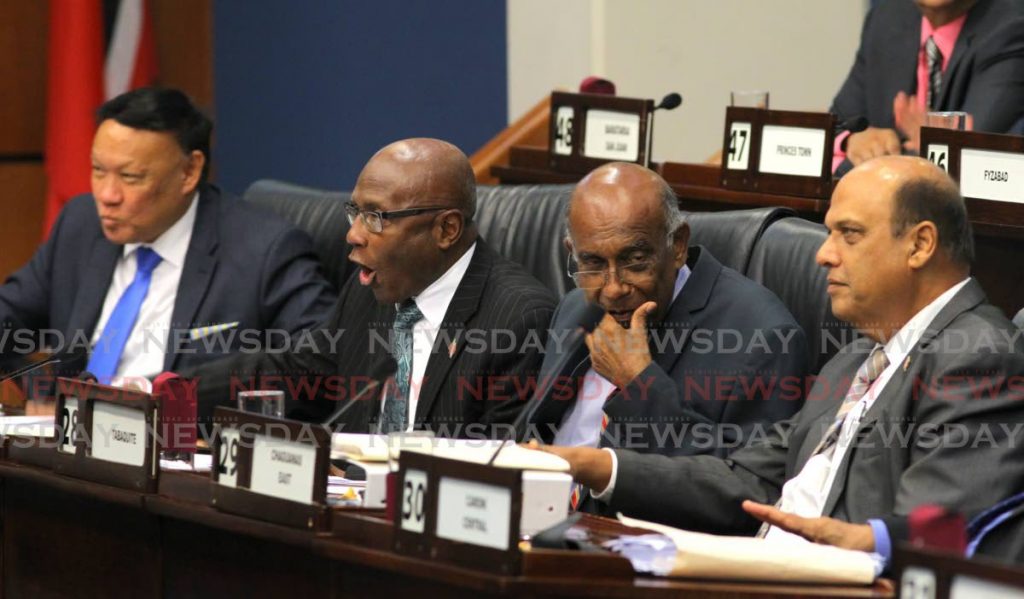Opposition votes with Govt on new $100 bill

THE House of Representatives at 10.20 pm on Friday unanimously passed a bill to replace the existing $100 bank note with a new polymer bill.
Some 31 Opposition and Government MPs voted together to pass the Miscellaneous Provisions (Proceeds of Crime and Central Bank) Bill 2019.
Those speaking on the bill were Finance Minister Colm Imbert, Pointe-a-Pierre MP David Lee, Chaguanas West MP Ganga Singh, National Security Minister Stuart Young and Attorney-General Faris Al-Rawi.
Having passed this bill against drug-trafficking, money-laundering and human-trafficking, the House resumes on Wednesday at to debate two bills on marijuana decriminalisation.
The Senate sits on Saturday at 1.30 pm to debate the money bill.
Young told the House the bill to replace existing $100 banknotes with polymer bills will curb a host of crimes. He said it will supplement previous explain-your-wealth legislation to curb offences like money laundering.
Young said trafficking in illegal drugs and illegal firearms are businesses done in TT using cash, not credit cards or Linx cards.
“It also will deal with corruption. A lot of planning has gone into this a lot of consultation.” He said law-abiding citizens need not fear the changeover. “All you have to do is take in your old notes and exchange them for new notes.”
Young justified the bill. “Up to recently we cracked a ring where person were bleaching $1 notes and printing it as blue notes. You can’t do that with polymer notes very easily.” The new notes with braille will also help the blind.
Young accused Singh of trying to create a sense of frenzy and panic, over the change. He justified, “The real reason behind this (bill) is a national security reason.”
Young said it would completely defeat the purpose of the bill to publicly say when the change in banknotes will be made.
Young said banks won’t benefit from demonetisation as they must incur extra costs to carry out this change, not the Government. The banks were told to increase their resources to make the change, he related.
He noted, “The implementer and administrator of this act is the Central Bank.” Credit unions, like everyone, must bring in their notes for replacement.
“So no need for any scare there.”
Young said a problem in India’s demonetisation had been insufficient new notes. “I give the population the assurance the replacement notes are available and will be available.”
He said India’s demonetisation was done in a short period, with a population of 1.3 billion, but TT has just 1.3 million people.
Young said he had been assured by the experience of demonetisation in Mauritius, whose population and circumstances are similar to TT.
“There is absolutely no need for any sense of anxiety or panic whatsoever.”
Young said the change must be done “very carefully and very sequentially.”
Once the bill is passed in both Houses, the Central Bank governor will announce the date of demonetisation.
He said the existing law gives three months notice to demonetise, but the bill shortens this notification period to 14 days.
Saying drug trafficking and human trafficking exist in TT, Young said, “The real ones behind organised crime are using cash. They hoard it.”
Young said people who are ill or abroad will be catered for, so as to change their money.
He reckoned the process of demonetisation could stimulate the economy by people trying to put black money into the financial system.
Young said police raids have shown evidence that dirty money exists. He said banks see demonetisation as a move towards a cashless system.
Attorney General Faris Al-Rawi spoke next and then Imbert wound up.


Comments
"Opposition votes with Govt on new $100 bill"